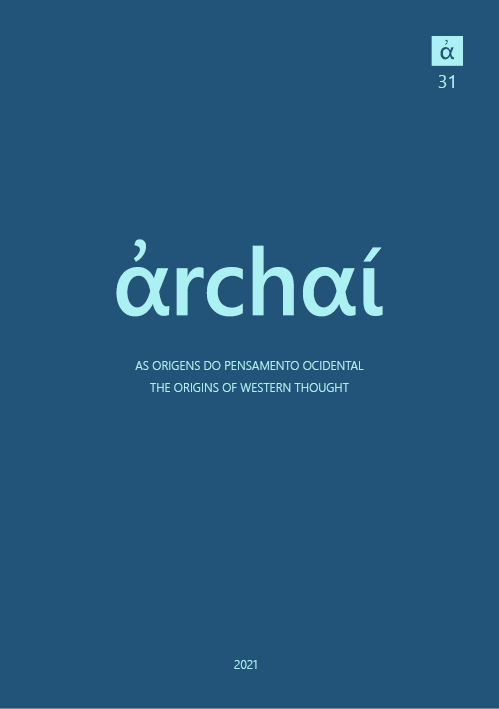The paradigm of fragmented sensitivity in Gorgias' 'PTMO'
DOI:
https://doi.org/10.14195/1984-249X_31_29Keywords:
Gorgias, sensitivity, proper sensible, Peri tou me ontosAbstract
The article aims to show the importance of Gorgias’ treatment of sensation and its relation to thought and language in the two preserved summaries of the Peri tou me ontos (PTMO). I argue that Gorgias postulates there a radical fragmentation of man in multiple sensations, as well as of the object in a multiplicity of edges that do not find any synthetic moment. The paradigm of fragmented sensitivity is the central scheme, unquestioned in the treatise, that will be projected to the relationships between being, thought and discourse to support the theses of the impossibility of knowledge and communication. Beyond Gorgias’ intentions, the article aims to exhibit the important projections of the aporias raised by him as shown in Plato and Aristotle's proposals regarding sensitivity.Downloads
References
CASSIN, B. (1980). Si Parmenide, Le traité anonyme De Melisso Xenophane Gorgia. Edition critique et commentaire, Presses
Universitaires de Lille.
CASTON, V. (2002). Gorgias on Thought and its Objects. In: CASTON, V.; GRAHAM, D. W. Presocratic Philosophy, Essays in
Honour of Alexander Mourelatos. Ashgate, p. 205-231.
DIELS, H.-Kranz, W. (1952). Die Fragmente der Vorsokratiker. Berlin, 3 vols., Weidmann.
GIGON, O. (1936). Gorgias Über das Nichtsein. Hermes 71, p. 186- 213 (reimpreso en Studien zur antikern Philosophie, Berlin-New
York, 1972, p. 69-97).
IOLI, R. (2007). Il silenzio di Platone e Aristotele sul di Gorgia. Dianoia 12, p. 7–42.
KERFERD, G. B. (1955). Gorgias on nature of that which is not. Phronesis I, n. 1, p. 3-25.
MAZZARA, G. (1999). Gorgia. La Retorica del Verosimile, Sankt Agustin, Academia Verlag.
MIGLIORI, M. (1999). Gorgia quale sofista di riferimento di Platone. Giornale di Metafisica 21 (1), p. 101-126.
MOURELATOS, A. P. D. (1987). Gorgias on the Function of Language. Philosophical Topics XV, 2, p. 135-170.
ROSSETTI, L. (2017). Trilemmi: il PTMO di Gorgia tra Zenone e Meliso. Peitho, Examina Antiqua 1 (8).
SPANGENBERG, P. (2009). Phantasía y verdad en Protágoras. In: MARCOS, G.; DÍAZ, M. E. (eds.) El surgimiento de la phantasía en
la Grecia clásica. Buenos Aires, Prometeo, p. 69-98.
SPANGENBERG, P. (2011). “Estudio introductorio” a Gorgias, Sobre el no ser, Buenos Aires.
UNTERSTEINER, M. (1967), Sofisti. Testimonianze e frammenti. Florencia, La Nuova Italia.
Downloads
Published
How to Cite
Issue
Section
License
Copyright (c) 2021 Pilar Spangeberg

This work is licensed under a Creative Commons Attribution 4.0 International License.
Given the public access policy of the journal, the use of the published texts is free, with the obligation of recognizing the original authorship and the first publication in this journal. The authors of the published contributions are entirely and exclusively responsible for their contents.
1. The authors authorize the publication of the article in this journal.
2. The authors guarantee that the contribution is original, and take full responsibility for its content in case of impugnation by third parties.
3. The authors guarantee that the contribution is not under evaluation in another journal.
4. The authors keep the copyright and convey to the journal the right of first publication, the work being licensed under a Creative Commons Attribution License-BY.
5. The authors are allowed and stimulated to publicize and distribute their work on-line after the publication in the journal.
6. The authors of the approved works authorize the journal to distribute their content, after publication, for reproduction in content indexes, virtual libraries and similars.
7. The editors reserve the right to make adjustments to the text and to adequate the article to the editorial rules of the journal.



